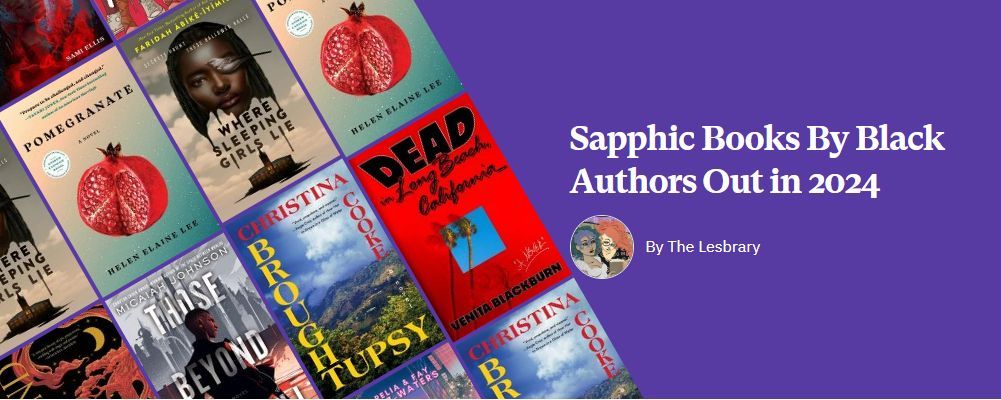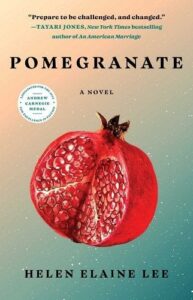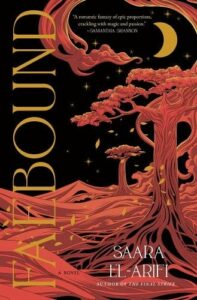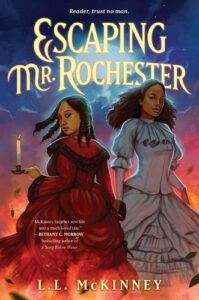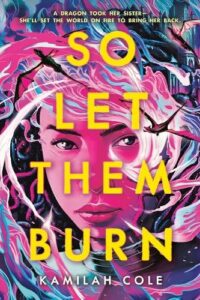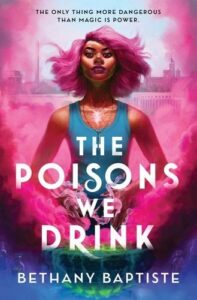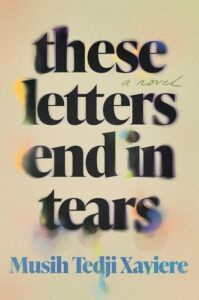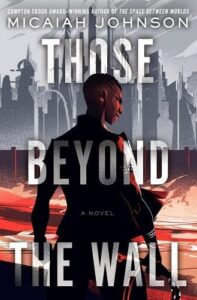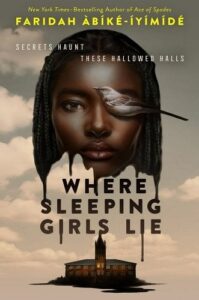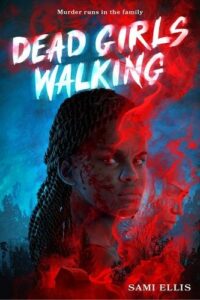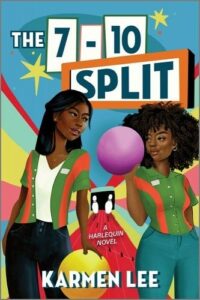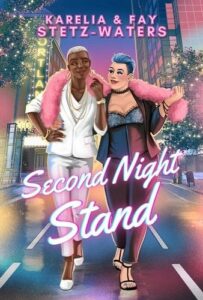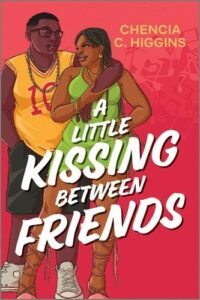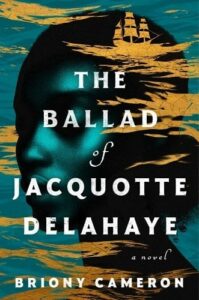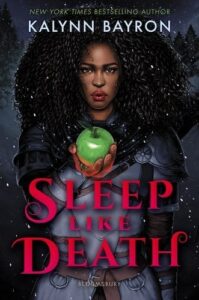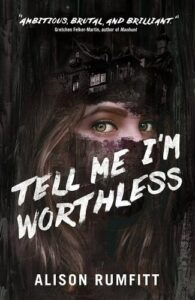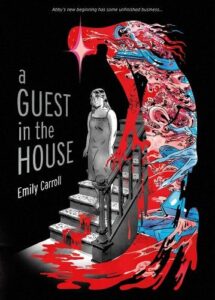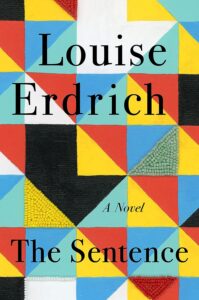I’ve updated the Lesbrary Recommendations List! This is the page where I keep a consolidated list of every sapphic book I’ve read and enjoyed, organized by genre. I’ve been reading sapphic books for quite a while now, so the list has grown to roughly 250 books! Most of them are also linked to my review, so you can see my full thoughts on the book. Check it out to get a ton of sapphic book recs!
Author Archives: Danika Ellis
Sapphic Books by Black Authors Out in 2024
It’s Black History Month, so I wanted to highlight some of the sapphic books out this year from Black authors! Quite a few came out in January, so you can buy those now, but this is also the perfect time to preorder the books coming out later this year.
I want to throw some quick disclaimers out there: I tried to double-check each of these for both sapphic content and that they are, in fact, by Black authors, but please let me know if I got anything wrong: reliable information about upcoming releases is always harder to find. If you’re an author of one of these books and would rather it wasn’t included in this list for any reason, let me know and I’ll remove it.
Also, let me know in the comments if I missed any sapphic books by Black authors out this year! I’m always looking for more. At this point, there isn’t a lot of information out there about books coming out in the back half of the year, so this list ends in June.
Scroll down for the publisher descriptions of all of these titles, or you can browse through them on Bookshop.org.
January:
Dead in Long Beach, California by Venita Blackburn (Queer Fiction)
Coral is the first person to discover her brother Jay’s dead body in the wake of his suicide. There’s no note, only a drably furnished bachelor pad in Long Beach, California, and a cell phone with a handful of numbers in it. Coral pockets the phone. And then she starts responding to texts as her dead brother.
Over the course of one week, Coral, the successful yet lonely author of a hit dystopian novel, Wildfire, becomes increasingly untethered from reality. Blindsided by grief and operating with reckless determination, she doubles –and triples–down on posing as her brother, risking not only her own sanity but her relationship with her precocious niece, Khadijah. As Coral’s swirl of lies slowly closes in on her, the quirky and mysterious alien world of Wildfire becomes enmeshed in her own reality, in the process pushing long-buried memories, traumas, and secrets dangerously into the present.
A form-shifting and soul-crunching chronicle of grief and crisis, Venita Blackburn’s debut novel, Dead in Long Beach, California, is a fleet-footed marvel of self-discovery and storytelling that explores the depths of humankind’s capacity for harm and healing. With the daring, often hilarious imagination that made her an acclaimed short-fiction innovator, Blackburn crafts a layered, page-turning reckoning with what it means to be alive, dead, and somewhere in between.
Broughtupsy by Christina Cooke (Lesbian Fiction)
At once cinematic yet intimate, Broughtupsy is an enthralling debut novel about a young Jamaican woman grappling with grief as she discovers her family, her home, is always just out of reach
Tired of not having a place to land, twenty-year-old Akúa flies from Canada to her native Jamaica to reconnect with her estranged sister Tamika. Their younger brother Bryson has recently passed from sickle cell anemia–the same disease that took their mother ten years prior–and Akúa carries his remains in a small wooden box with the hope of reassembling her family.
Over the span of two fateful weeks, Akúa and Tamika visit significant places from their childhood, but time spent with her sister only clarifies how different they are, and how years of living abroad have distanced Akúa from her home culture. “Am I Jamaican?” she asks herself again and again. Beneath these haunting doubts lie anger and resentment at being abandoned by her own blood. “Why didn’t you stay with me?” she wants to ask Tamika.
Wandering through Kingston with her brother’s ashes in tow, Akúa meets Jayda, a brash stripper who shows her a different side of the city. As the two grow closer, Akúa confronts the difficult reality of being gay in a deeply religious family, and what being a gay woman in Jamaica actually means.
By turns diasporic family saga, bildungsroman, and terse sexual awakening, Broughtupsy is a profoundly moving debut novel that asks: what do we truly owe our family, and what are we willing to do to savor the feeling of home?
Pomegranate by Helen Elaine Lee (Queer Woman Fiction) (Paperback Rerelease)
Ranita Atwater is “getting short.”
She is almost done with her four-year sentence for opiate possession at Oak Hills Correctional Center. Three years sober, she is determined to stay clean and regain custody of her two children. Ranita is regaining her freedom, but she’s leaving behind her lover Maxine, who has inspired her to imagine herself and the world differently.
My name is Ranita, and I’m an addict, she has said again and again at recovery meetings. But who else is she? Who might she choose to become? Now she must steer clear of the temptations that have pulled her down, while atoning for her missteps and facing old wounds. With a fierce, smart, and sometimes funny voice, Ranita reveals how rocky and winding the path to wellness is for a Black woman, even as she draws on family, memory, faith, and love in order to choose life.
Pomegranate is a complex portrayal of queer Black womanhood and marginalization in America from an author “working at the height of her powers” (Tayari Jones, New York Times bestselling). In lyrical and precise prose, Helen Elaine Lee paints a humane and unflinching portrait of the devastating effects of incarceration and addiction, and of one woman’s determination to tell her story.
Faebound by Saara El-Arifi (Sapphic Fantasy)
Two elven sisters become imprisoned in the intoxicating world of the fae, where danger and love lie in wait. Faebound is the first book in an enchanting new trilogy from the Sunday Times bestselling author of The Final Strife.
Yeeran was born on the battlefield, has lived on the battlefield, and one day, she knows, she’ll die on the battlefield.
As a warrior in the elven army, Yeeran has known nothing but violence her whole life. Her sister, Lettle, is trying to make a living as a diviner, seeking prophecies of a better future.
When a fatal mistake leads to Yeeran’s exile from the Elven Lands, both sisters are forced into the terrifying wilderness beyond their borders.There they encounter the impossible: the fae court. The fae haven’t been seen for a millennium. But now Yeeran and Lettle are thrust into their seductive world, torn among their loyalties to each other, their elven homeland, and their hearts.
Escaping Mr. Rochester by L.L. McKinney (Sapphic YA Jane Eyre Retelling)
In this fresh reimagining of Charlotte Brontë‘s classic novel by acclaimed author L. L. McKinney, Jane Eyre and Bertha Mason must save each other from the horrifying machinations of Mr. Rochester in this intrigue-filled, empowering young adult romance.
Jane Eyre has no interest in a husband. Eager to make her own way in the world, she accepts the governess position at Thornfield Hall.
Though her new employer, Edward Rochester, has a charming air–not to mention a handsome face–Jane discovers that his smile can sharpen in an instant. Plagued by Edward’s mercurial mood and the strange wails that echo through the corridors, Jane grows suspicious of the secrets hidden within Thornfield Hall–unaware of the true horrors lurking above her very head.
On the topmost floor, Bertha Mason is trapped in more ways than one. After her whirlwind marriage to Edward turned into a nightmare, he locked her away as revenge for withholding her inheritance. Now his patience grows thin in the face of Bertha’s resilience and Jane’s persistent questions, and both young women are in more danger than they realize.
When their only chance at safety–and perhaps something more–is in each other’s arms, can they find and keep one another safe before Edward’s dark machinations close in around them?
So Let Them Burn by Kamilah Cole (Lesbian and Demisexual Fantasy)
Whip-smart and immersive, this Jamaican-inspired fantasy follows a gods-blessed heroine who’s forced to choose between saving her sister or protecting her homeland–perfect for fans of Iron Widow and The Priory of the Orange Tree.
Faron Vincent can channel the power of the gods. Five years ago, she used her divine magic to liberate her island from its enemies, the dragon-riding Langley Empire. But now, at seventeen, Faron is all powered up with no wars to fight. She’s a legend to her people and a nuisance to her neighbors.
When she’s forced to attend an international peace summit, Faron expects that she will perform tricks like a trained pet and then go home. She doesn’t expect her older sister, Elara, forming an unprecedented bond with an enemy dragon–or the gods claiming the only way to break that bond is to kill her sister.
As Faron’s desperation to find another solution takes her down a dark path, and Elara discovers the shocking secrets at the heart of the Langley Empire, both must make difficult choices that will shape each other’s lives, as well as the fate of their world.
March:
The Poisons We Drink by Bethany Baptiste (Bisexual YA Fantasy) (March 5)
Love potions is a dangerous business. Brewing has painful, debilitating side effects, and getting caught means death or a prison sentence. But what Venus is most afraid of is the dark, sentient magic within her.
Then an enemy’s iron bullet kills her mother, Venus’s life implodes. Keeping her reckless little sister Janus safe is now her responsibility. When the powerful Grand Witcher, the ruthless head of her coven, offers Venus the chance to punish her mother’s killer, she has to pay a steep price for revenge. The cost? Brew poisonous potions to enslave D.C.’s most influential politicians.
As Venus crawls deeper into the corrupt underbelly of her city, the line between magic and power blurs, and it’s hard to tell who to trust…Herself included.
The Poisons We Drink is a potent YA debut about a world where love potions are weaponized against hate and prejudice, sisterhood is unbreakable, and self-love is life and death.
These Letters End in Tears by Musih Tedji Xaviere (Sapphic Fiction) (March 12)
Set in a country where being gay is punishable by law, These Letters End in Tears is the heart-wrenching forbidden love story of a Christian girl with a rebellious heart and a Muslim girl leading a double life.
Bessem notices Fatima for the first time on the soccer field–muscular and focused, she’s the only woman playing and seems completely at ease. When Fatima chases a rogue ball in her direction, Bessem freezes, mesmerized by the athlete’s charm and beauty. One playful wink from Fatima, and Bessem knows her life will never be the same.
In Cameroon, a country where same-sex relationships are punishable by law, the odds are stacked against Bessem and Fatima from the start. And when Fatima’s older brother, a staunch Muslim, finds out about their affair, he intervenes by physically assaulting them, an incident that precedes a police raid at the only gay bar in town. After spending days in jail, Fatima goes missing without a trace, and Bessem is left with only rumors of her whereabouts. Has Fatima been sentenced to an unknown prison? Has she been banished from her community, or married off, as some have suggested? Or something even more sinister?
Thirteen years later, Bessem is now a university professor leading a relatively quiet life, occasionally and secretly dating other women. However, she has never forgotten Fatima. After spotting a mutual friend for the first time in years–the last person who may have seen Fatima–Bessem embarks on a winding search for her lost love.
Those Beyond the Wall (The Space Between Worlds #2) by Micaiah Johnson (Sapphic Science Fiction) (March 12)
Faced with a coming apocalypse, a woman must reckon with her past to solve a series of sudden and inexplicable deaths in a searing sci-fi thriller from the Compton Crook Award-winning author of The Space Between Worlds.
In Ashtown, a rough-and-tumble desert community, the Emperor rules with poisoned claws and an iron fist. He can’t show any sign of weakness, as the neighboring Wiley City has spent lifetimes beating down the people of Ashtown and would love nothing more than its downfall. There’s only one person in the desert the Emperor can fully trust–and her name is Scales.
Scales is the best at what she does: keeping everyone and everything in line. As a skilled mechanic–and an even more skilled fighter, when she needs to be–Scales is a respected member of the Emperor’s crew, who’s able to keep things running smoothly. But the fragile peace Scales helps to maintain is fractured when a woman is mangled and killed before her eyes. Even more incomprehensible: There doesn’t seem to be a murderer.
When more bodies start to turn up, both in Ashtown and in the wealthier, walled-off Wiley City, Scales is tasked with finding the cause–and putting an end to it by any means necessary. To protect the people she loves, she teams up with a frustratingly by-the-books partner from Ashtown and a brusque-but-brilliant scientist from the City, delving into both worlds to track down an invisible killer.
But the answers Scales finds are bigger than she ever could have imagined, leading her into the brutal heart beneath Wiley City’s pristine façade and dredging up secrets from her own past that she would rather keep hidden. If she wants to save the world from the earth-shattering truths she uncovers, she can no longer remain silent–even if speaking up costs her everything.
Where Sleeping Girls Lie by Faridah Àbíké-Íyímídé (Sapphic YA Horror) (March 19)
In Where Sleeping Girls Lie — a YA contemporary mystery by Faridah Àbíké-Íyímídé, the New York Times-bestselling author of Ace of Spades — a girl new to boarding school discovers dark secrets and coverups after her roommate disappears.
It’s like I keep stumbling into a dark room, searching for the switch to make things bright again…
Sade Hussein is starting her third year of high school, this time at the prestigious Alfred Nobel Academy boarding school after being home-schooled all her life. Misfortune has been a constant companion all her life, but even Sade doesn’t expect her new roommate, Elizabeth, to disappear after Sade’s first night. Or for people to think she had something to do with it.
With rumors swirling around her, Sade catches the attention of the girls collectively known as the ‘Unholy Trinity’ and they bring her into their fold. Between learning more about them–especially Persephone, who Sade is inexplicably drawn to–and playing catchup in class, Sade already has so much on her plate. But when it seems people don’t care enough about what happened to Elizabeth to really investigate, it’s up to she and Elizabeth’s best friend to solve it.
And then a student is found dead.
As they keep trying to figure out what’s going on, Sade realizes there’s more to Alfred Nobel Academy and its students than she thought. Secrets lurk around every corner and beneath every surface…secrets that rival even her own.
Dead Girls Walking by Sami Ellis (Sapphic YA Horror) (March 26)
Sami Ellis’s Dead Girls Walking is a shocking, spine-chilling YA horror slasher about a girl searching for her dead mother’s body at the summer camp that was once her serial killer father’s home–perfect for fans of Friday the 13th and White Smoke.
Temple Baker knows that evil runs in her blood. Her father is the North Point Killer, an infamous serial killer known for how he marked each of his victims with a brand. He was convicted for murdering 20 people and was the talk of countless true crime blogs for years. Some say he was possessed by a demon. Some say that they never found all his victims. Some say that even though he’s now behind bars, people are still dying in the woods. Despite everything though, Temple never believed that her dad killed her mom. But when he confesses to that crime while on death row, she has no choice but to return to his old hunting grounds to try see if she can find a body and prove it.
Turns out, the farm that was once her father’s hunting grounds and her home has been turned into an overnight camp for queer, horror-obsessed girls. So Temple poses as a camp counselor to go digging in the woods. While she’s not used to hanging out with girls her own age and feels ambivalent at best about these true crime enthusiasts, she tries her best to fit in and keep her true identity hidden.
But when a girl turns up dead in the woods, she fears that one of her father’s “fans” might be mimicking his crimes. As Temple tries to uncover the truth and keep the campers safe, she comes to realize that there may be something stranger and more sinister at work–and that her father may not have been the only monster in these woods.
April:
Something Kindred by Ciera Burch (Bisexual YA Gothic) (April 2)
Welcome to Coldwater. Come for the ghosts, stay for the drama.
Jericka Walker had planned to spend the summer before senior year soaking up the sun with her best friend on the Jersey Shore. Instead she finds herself in Coldwater, Maryland, a small town with a dark and complicated past where her estranged grandmother lives–someone she knows only two things about: her name and the fact that she left Jericka’s mother and uncle when they were children. But now Jericka’s grandmother is dying, and her mother has dragged Jericka along to say goodbye.
As Jericka attempts to form a connection with a woman she’s never known, and adjusts to life in a town where everything closes before dinner, she meets “ghost girl” Kat, a girl eager to leave Coldwater and more exciting than a person has any right to be. But Coldwater has a few unsettling secrets of its own. The more you try to leave, the stronger the town’s hold. As Jericka feels the chilling pull of her family’s past, she begins to question everything she thought she knew about her mother, her childhood, and the lines between the living and the dead.
May:
Thirsty by Jas Hammonds (Sapphic YA Contemporary) (May 14)
It’s the summer before college and eighteen-year-old Blake Brenner and her girlfriend, Ella, have one goal: join the mysterious and exclusive Serena Society. The sorority promises status and lifelong connections to a network of powerful, trailblazing women of color. Ella’s acceptance is a sure thing–she’s the daughter of a Serena alum. Blake, however, has a lot more to prove.
As a former loner from a working-class background, Blake lacks Ella’s pedigree and confidence. Luckily, she finds courage at the bottom of a liquor bottle. When she drinks, she’s bold, funny, and unstoppable–and the Serenas love it. But as pledging intensifies, so does Blake’s drinking, until it’s seeping into every corner of her life. Ella assures Blake that she’s fine; partying hard is what it takes to make the cut . . .But success has never felt so much like drowning. With her future hanging in the balance and her past dragging her down, Blake must decide how far she’s willing to go to achieve her glittering dreams of success–and how much of herself she’s willing to lose in the process.
The 7-10 Split by Karmen Lee (F/F Romance) (May 21)
This is how love rolls…
For teacher Ava Williams, some subjects are not up for debate. Like history–specifically, the one she has with Grace Jones, bowling pro and local celeb. Who is now, for no identifiable reason, teaching at the same small-town Georgia high school as Ava. Once upon a time, they were thick as thieves, best friends, rivals who pushed each other, and total bowling nerds. Then they shared a kiss, sweet and confusing…and after that, they split and nothing was ever the same.
Ava is pretty sure she has every reason to hate Grace. Especially when the school’s soggy potato of a principal announces–finally–that the students can have the bowling team Ava has been pushing for, for years…only to hand it to Grace.
Now they’re expected to be partners and lead their new bowling team to victory in six months. And with that, their rivalry is back. Fierce, ultracompetitive…and with an undeniable attraction that pushes, pulls and crashes together. It’s history. It’s chemistry. And it’s just a matter of time before it explodes…one way or the other.
Second Night Stand by Karelia Stetz-Waters and Fay Stetz-Waters (F/F Romance) (May 21)
Prima ballet dancer Lillian Jackson is all about control–on stage and in bed. Which is precisely why she keeps her hook-ups to one night, and one night only. No strings. No phone numbers. No scones in the morning. There’s no room for mistakes, especially now that her dance company’s survival depends entirely on winning a million-dollar cash prize in one of America’s biggest reality competitions. That is, until one night with a certain curvy, blue-haired siren changes everything . . .
As burlesque dancer “Blue Lenox,” Izzy Wells is the queen of on-stage seduction. Almost no one knows that she’s close to losing everything–her theater, her home, and her troupe–unless she wins this competition. Now she’s going toe-to-toe with a gorgeous ballerina in front of the world. The chemistry between them is hot, but even more distracting are the feelings they’re starting to develop. There’s no way Lillian can fit Izzy into her life, and Izzy knows better than to fall for someone who can’t put her first. But if they can make it through the show with their hearts and dreams intact, they just might win the biggest prize of all.
A Little Kissing Between Friends by Chencia C. Higgins (F/F Romance) (May 28)
Music producer on the rise Cyn Tha Starr knows what she likes, from her sickening beats in the studio to the flirty femmes she fools around with. Her ever-rotating roster has never been a problem until her latest fling clashes with Jucee, her best friend and the most popular dancer at strip club Sanity.
It makes Cyn see Jucee in a different light. One with far fewer boundaries and a lot more kissing.
Juleesa Jones makes great money dancing the early shift and spends most evenings with her son, her Sanity family or at Cyn’s house. Relationships are not high on the priority list–until she’s forced to admit that maybe friendship isn’t the only thing she wants from her bestie.
But hooking up with your ride-or-die is risky. Jucee isn’t just Cyn’s best friend–Jucee is her muse. When Cyn lays down her beats, it’s Jucee she imagines in the club throwing it back to every note. If they aren’t careful, this could crash and burn…but isn’t real love worth it?
June:
The Ballad of Jacquotte Delahaye by Briony Cameron (F/F Pirate Historical Fiction) (June 4)
This epic, dazzling tale based on true events illuminates a woman of color’s rise to power as one of the few purported female pirate captains to sail the Caribbean, and the forbidden love story that will shape the course of history.
In the tumultuous town of Yáquimo, Santo Domingo, Jacquotte Delahaye is an unknown but up-and-coming shipwright. Her dreams are bold but her ambitions are bound by the confines of her life with her self-seeking French father. When her way of life and the delicate balance of power in the town are threatened, she is forced to flee her home and become a woman on the run along with a motley crew of refugees, including a mysterious young woman named Teresa.
Jacquotte and her band become indentured servants to the infamous Blackhand, a ruthless pirate captain who rules his ship with an iron fist. As they struggle to survive his brutality, Jacquotte finds herself unable to resist Teresa despite their differences. When Blackhand hatches a dangerous scheme to steal a Portuguese shipment of jewels, Jacquotte must rely on her wits, resourcefulness, and friends to survive. But she discovers there is a grander, darker scheme of treachery at play, and she ultimately must decide what price she is willing to pay to secure a better future for them all.
An unforgettable tale told in three parts, The Ballad of Jacquotte Delahaye is a thrilling, buccaneering escapade filled with siege and battle, and is also a tender exploration of friendship, love, and the search for freedom and home.
Sleep Like Death by Kalynn Bayron (Bisexual YA Fantasy) (June 25)
Cinderella is dead, but Snow White fights on . . .
New York Times bestselling author Kalynn Bayron makes her highly anticipated return to the realm of fairy tales with this thrilling twist on the classic story of Snow White.
Princess Eve was raised with one purpose: to destroy the Knight, an evil sorcerer who terrorizes Queens Bridge with his wicked magic. Her own unique magic–the ability to conjure weapons from nature–makes her a worthy adversary. Far too many of subjects of Queens Bridge have been devastated by the Knight’s trickery.
As she approaches her seventeenth birthday, Eve is ready to battle. But her mother, Queen Regina, has been acting bizarrely, talking to a strange mirror alone every night. Then a young man claiming to be the Knight’s messenger appears and shares a shocking truth about Eve’s past. Unsure of who to trust or what to do next, Eve must find the courage to do what she’s always done: fight. But will it be enough to save her family and her queendom?
You might also be interested in Reading Black Joy: 27 F/F Romances by Black Authors. You can also browse the Black Author tag for Lesbrary reviews of sapphic books by Black authors.
A Bittersweet Portrait of Platonic Partnership: Significant Others by Zoe Eisenberg
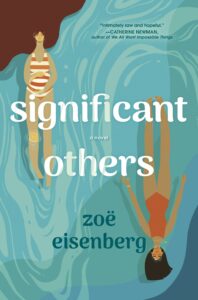
Buy this from Bookshop.org to support local bookstores and the Lesbrary!
Jess and Ren were college roommates, and they have been inseparable ever since. That’s acceptable in college, but much less common when you’re in your late 30s, have bought a house together, and co-parent a dog. They’re committed to each other, but not dating—Jess is bisexual, and Ren is straight. Jess has always been the responsible one, taking care of Ren. While Jess has a successful career in real estate, Ren is aimless, working at a bar and teaching dance classes at a gym while looking for what to do next. When Ren accidentally gets pregnant after a hookup, she decides to keep the baby, and Jess—as she always does—agrees to help. Then the father of Ren’s unborn baby reappears in their lives, and everything gets a lot more complicated.
College had been full of friendships like ours, when it was natural, normal, to wear each other’s clothes, to do one another’s eyeliner with stoic concentration as warm breath washed over our faces in comforting waves. It was only later that we seemed to mystify people, as if the normalcy of our specific kind of closeness had an expiration date, like milk.
At the beginning of this story, it felt so cozy. I loved the idea of this found family and their unconventional living arrangement. They discuss how romantic relationships are seen as more reliable than their decades-long friendship, and even Ren’s brother, who lives with the two of them, thinks Jess must secretly be in love with Ren.
But despite their closeness, this isn’t an idyllic found family. There is so much under the surface of Jess and Ren’s relationship. Like with many relationships (romantic, familial, friendship) that have gone on for many years, every argument has a dozen other arguments bubbling beneath the surface. A lot of their dynamic with each other has been something they’ve passively let develop instead of actually questioning what they want from this relationship and why. The tension between that cozy, comforting notion of building a life together with a friend and the reality of their flawed relationship really got to me. There’s something so beautiful and sad about this story.
In the middle of the afternoon I might receive a snapshot of the remnants of her lunch. The grainy crust of a sandwich. A half-eaten container of yogurt. Killed it, the note would read. We’d had this type of exchange a thousand times. Two thousand. Unexceptional. Ordinary. The way truly intimate things usually are.
Then, of course, there’s the pregnancy—and the father, Quincy. Quincy is…fine. He’s not a terrible person. I can see how people could find him charming. But for me, when you’re getting a story about this complex relationship between two women and then some dude comes stumbling into it and messing everything up, I’m going to resent that guy! I own that as a flaw of mine as a reader. Despite him not at all being a villain, and in fact being similarly flawed and human to Ren and Jess, I never fully got over my irritation with him, even if ultimately he might have been a necessary catalyst.
I watched them for a bit trying to determine whether they were friends or partners, sisters, maybe cousins, before deciding it didn’t really matter, because there they were, enjoying one another.
Despite this not being a plot-driven book—it’s a portrait of these characters and how they interact with each other—I find it difficult to discuss without spoilers. (vague spoilers) I will say that this did make me cry, and that although the ending isn’t what I wanted, on reflection, it’s the one that makes sense. Was the connection between Jess and Ren an inspiring platonic partnership, or a codependent friendship? Both, of course, and maybe neither. This is a bittersweet story that left my heart aching. (end of spoilers)
One aspect I’m not sure how I feel about is that this is set in Hawaii, and protests and politics (about tourism, telescopes, water, colonialism, and more) are often mentioned, but they are playing out in the background, not a focus of the narrative.
If you’re looking for a fluffy story of found family and the power of friendship, this might not be the best choice: it gets into how these relationships are just as fraught as romances. But if you’re looking for a portrait of a complicated relationship between two women, I highly recommend this one.
A Sapphic Asexual Manga Romance: Doughnuts Under a Crescent Moon Series by Shio Usui
Buy this from Bookshop.org to support local bookstores and the Lesbrary!
I’m always looking for more sapphic manga with adult main characters: until recently, yuri stories between schoolgirls was about all I could find available in English. While some of those are great, I am excited to see more queer manga coming out now with other kinds of representation, including some fantastic F/F love stories between adults.
This four-volume series is a quiet love story between two coworkers. In volume one, Hinako is self-loathing. She feels defective for failing to fall in love (with men) and spends spends her time and energy trying to be normal through makeup, fashion, and unsuccessful dating. Meanwhile, Asahi is isolated because she had to raise her little sister when their parents died, which meant she had to grow up fast.
As the two of them begin to bond over lunch breaks, sharing donuts together, they struggle to define what they are to each other. Heteronormativity and allonormativity make it difficult for them to understand how they can be so important to each other without wanting a sexual aspect to their relationship.
This has a melancholic tone, but it’s also gentle and comforting. I liked the slow build of their relationship, and I was happily surprised that this has asexual representation. (The terms aren’t used, but both characters are probably lesbians on the asexual spectrum.) I also appreciated the side characters, like Asahi’s best friend Fuuka and her little sister Subaru. They added some levity and excitement to a more slow-paced love story between Asahi and Hinako.
Doughnuts Under a Crescent Moon isn’t my favourite sapphic manga: it’s a little sadder than I’d prefer, I wish the representation was a bit clearer, and the conclusion is a bit abrupt, but I still really enjoyed it, and I’m happy to see more adult sapphic manga available in English now!
A Steamy Lesbian Historical Romance in France: An Island Princess Starts a Scandal by Adriana Herrera
Buy this from Bookshop.org to support local bookstores and the Lesbrary!
“A person could live a lifetime in six weeks, Your Grace. Entire lives have been changed in less.”
Picture this: it’s summer, your sunscreen is applied, and you’ve taken the day off to spend solo on the beach. You’ve already taken a dip in the ocean. You lay out your towel and get all your fun drinks and snacks ready, and you pull out An Island Princess Starts a Scandal: a steamy F/F romance set in 1889 Paris. Bliss. That’s how I read this title, and it was the perfect setting for this romp of a romance read.
I’m not usually a big romance reader, especially historical romance, but this changed my mind about what a historical romance novel could be. It has such a fun premise. Manuela is a lesbian engaged to a wealthy man, but she has a summer of freedom in Paris with her two best friends before she gets married. She plans to spend this time exploring the sapphic side of Paris in one last debaucherous adventure.
There, she meets Cora, a wealthy businesswoman giving off Anne Lister vibes. Basically the only thing of value to Manuela’s name as a single woman is a small parcel of land she inherited, and Cora needs it to complete a lucrative railway project. Manuela agrees to sell it on one condition: Cora needs to be her guide to the lesbian nightlife of Paris. Oh, and did I mention they already met once before at a queer sex club?
This made for a perfect beach read. I always love seeing the gay side of Paris in the late 1800s/early 1900s, especially the art and literary side. Manuela is a painter, so we see a bit of that: Manuela sees examples of women who have managed to make a living doing their art, something she thought was impossible.
That setting combined with the premise had me hooked from the beginning, and the dynamic between Manuela and Cora kept me reading. Manuela is reckless, indulgent, and clever, while Cora is more tightly wound and ambitious. They clash, but they’re also instantly obsessed with each other. Both are leveraging their power over each other before the land deal goes through for good, and they’re both pretending they’re fine with this being a purely physical, limited time fling.
I can’t leave off that this is perhaps the steamiest romance novel I’ve ever read. There are a lot of sex scenes, everything is described, and everything is described in detail.
I did sometimes get hung up on the writing style, because there are a ton of sentence fragments. They’re a stylistic choice, and I’m not saying it’s wrong to write that way, but they’re frequent. I did sometimes snag on that and get distracted from the story.
This is part of a trilogy of romance novels, each following one of three friends as their love stories play out simultaneously during this summer. I liked seeing glimpses into those stories, and though the other two are straight romances, I still might pick them up, since I had so much fun with this one. This is the second book in the series, technically, but I didn’t feel like I was missing anything by starting here.
If you’re looking for an immersive and sexy romance to escape with for a while, I highly recommend this one.
A House Haunted by Fascism: Tell Me I’m Worthless by Alison Rumfitt
Buy this from Bookshop.org to support local bookstores and the Lesbrary!
I feel so conflicted about Tell Me I’m Worthless, because it’s one the most thought-provoking and memorable horror books I’ve ever read. The sections I liked were captivating, and in the first chapter, this felt like a new favourite book. But there were also sections of this book I found unreadable.
I have to start by saying that this comes with strong content warnings (listed at the beginning of the book), including for rape, racism, transphobia, fascism, antisemitism, eugenics, and more. These topics aren’t just included: they are the central pillar of the story, and they’re described in detail. Be prepared for that going in.
This is a haunted house story, but it’s more about two people trying to live in a society so soaked in fascism that it’s easy to absorb it unconsciously. Both these main characters are bigoted. They’re deeply flawed. And they’re also compelling.
Alice, a white trans woman, and Ila, who is Jewish and mixed race, entered a haunted house three years ago with their friend Hannah, a cis white woman. Alice and Ila had a complicated relationship with a sexual and romantic element, while Hannah was always a bit removed from the other two. They each experienced their own trauma there that night, and Ila and Alice both believe that other sexually assaulted and scarred them. Hannah never left the house. Though Alice and Ila escaped, they can’t seem to free themselves entirely of its influence, and Ila convinces Alice they have to return to get closure.
While this house drives the plot—and even gets its own point of view—most of the book takes place outside of it, following Alice and Ila separately as they live in a sort of fog, unable to process what happened to them. Ila has made being transphobic practically a full time job, regularly giving talks at different institutions. The focus on these aimless, dissatisfied main characters is common in litfic, but less so in horror. Personally, I was drawn in by it, especially paired with the distinct, often meta writing style.
That writing style is precisely my hang-up with this book. Some of the writing was so effective, like the Hill House motif, but there were several points where it descended into pages and pages of hateful stream of consciousness that did not work for me at all. For example, there would be long tangents describing a dream or pages of a nonsensical auto-translated transphobic screed. At times, I completely zoned out. I understand what it was trying to do, but it really took me out of the story.
Still, it’s hard for me to put much stock in that when overall this was such a thought-provoking and powerful read. It’s a brutal book, but it’s purposeful and effective. If you’re looking for a horror book that will challenge you and leave you thinking about it long after you finish, you need to pick this up.
A Trans Teen Finds Her Words: Just Happy to Be Here by Naomi Kanakia
Buy this from Bookshop.org to support local bookstores and the Lesbrary!
Tara is the first trans girl to attend Ainsley Academy, an all-girls school. She finds it hard to fit in, especially considering that she’s also one of the few students of color. One place she does feel like she belongs is the Sibyls, an exclusive society within the school that values classical history. Tara’s passion is speeches throughout history, and she admires how the Sibyls stand behind their values and don’t seem to care what anyone else thinks about them. When she applies to join, though, she’s thrown into a controversy about who is allowed into this elite group for girls, and whether it should still exist at all.
This was an infuriating read. Tara is a young trans woman of color who seems to bounce between dealing with micro aggressions and macro aggressions; there’s almost no one she can just be herself around. Her parents are… somewhat accepting, but they often misgender her and question whether she’s sure enough about her transition to go on hormones. Tara desperately wants to be on hormones, but they live in a state where parents can have their kids taken away if they’re suspected of pushing them to transition. And because of their immigration status, they’re even more vulnerable. It’s not paranoia, either: they are reported at one point and interrogated by a state official.
Tara is used as a political pawn. Even people who are theoretically accepting just see as her as “the trans girl.” When she says anything that doesn’t match their idea of what a trans girl should be, they immediately push back against her, even when she’s just expressing her own insecurities. They seem more concerned about saying the right things than actually getting to know her. Even the trans guy at school uses her as an unwilling figurehead in his fight to take down the Sibyls for being exclusionary, ignoring that she loves the Sibyls and has no interest in dismantling the group.
Tara wants so badly to fit in, to be “ordinary”, and deals with a lot of internalized transphobia and racism. She doesn’t want to lead a charge against transphobia. She just wants to blend in.
I had to put down the book at some point because I was so full of rage on her behalf. The school administrators and teachers often have double standards for her: when it comes to benefits of being part of Ainsley Academy, Tara is technically part of the boys’ school. But when it comes to the drawbacks and discipline of students, she’s part of Ainsley. One of her teachers escalates from double standards to flat-out transphobic hate speech.
The Sibyls aren’t perfect, and in fact there are very good reasons to want to dismantle this not-so-secret society of rich women. But it is where Tara meets her first genuine friends, who treat her as an individual—including her crush, Felicity, who she gets closer and closer to. (Tara is bisexual, with a preference for women.) They’re all flawed people, and they may not always say the right thing, but they’re finally a place where Tara feels like she belongs and that people have her back—not for political reasons, but for her as a person.
Just Happy To Be Here has a long author’s note at the end with advice for trans girls, and that advice is not sugar-coated. It’s also frustrating that trans women and transfem YA is so new, and yet this author’s note feels even more urgent and dire than these books did a handful of years ago, when the first few trans YA titles were being published by mainstream presses. It’s horrific that it’s gotten even more dangerous to be a trans woman in the United States.
This was an emotionally harrowing read, full of non-stop transphobia—plus some added racism. It’s one I’m glad to have read, but I’m even more glad to be done.
How Queer is Queer Enough?: A Guest in the House by Emily Carroll
Buy this from Bookshop.org to support local bookstores and the Lesbrary!
I’ve loved everything I’ve read by Emily Carroll, and A Guest In the House was no exception. The subdued, gothic scenes of the quiet horror of compulsory heteronormativity interspersed with technicolour dream sequences were extremely effective. I felt deeply for Abby, who seems to sleepwalk through her life, doing what’s expected of her, until she learns about her new husband’s deceased first wife, Sheila. Soon, Sheila is appearing to her in dreams and then even when she’s awake, casting doubts about whether her husband is responsible for her death. As Abby begins to doubt her husband, her careful quiet life unravels, and she goes to dramatic lengths to try to save herself from Sheila’s fate.
This was one of my favourite books I read in 2023. The artwork, as usual for Emily Carroll, is stunning. The story is unsettling and captivating. And that ending! I stayed up reading because I had to know what happened next, and then I finished the book not sure how to interpret those final pages. I ended up researching reviews to find different theories. When I woke up the next morning, I immediately picked it up and read it cover to cover again, and while I still have questions, I now have my own theories!
As I read through Goodreads reviews, I became aware of two things. One, people hate an ambiguous ending. And two, somehow many (most?) readers completely missed the queer content of this book, even though it’s not at all hidden. I ended up writing a whole post about this on my queer books newsletter with Book Riot, Our Queerest Shelves: “How Queer Does a Book Have To Be For It To Count?“
The description of the book mentions Abby being “desperately in love for the first time in her life,” which can only be referring to Sheila—she has no romantic or sexual interest in her husband. She imagines herself as a knight saving Sheila. She pictures Sheila in revealing clothing, and when the ghost of Sheila calls her out on it, Abby blushes and stammers. More importantly, (spoiler, highlight to read) Abby and Sheila kiss on the page!! It may be a little distracting that they’re murdering someone at the same time, but there’s a kissing scene! (end of spoilers) How can that be misinterpreted as straight?
I’m still a little frustrated that I didn’t hear about this being a queer book, despite researching queer new releases and already being a fan of Emily Carroll. As I said in my Our Queerest Shelves post, “It’s disappointing that we still live in a world where queer people are still apparently harder to see than ghosts.”
If you can handle an ambiguous ending and don’t need your queer reads to be light and happy, I highly recommend this one. It’s an absorbing story with such stunning artwork that I want to frame pages and hang them on my wall. Emily Carroll continues to be one of my favourite graphic novelists, and I can’t wait to read what she writes next.
A Genre-Bending Haunted Bookstore Story: The Sentence by Louise Erdrich
Buy this from Bookshop.org to support local bookstores and the Lesbrary!
I kept hearing people rave about this book when it was new. I heard it was a cozy read about someone working in a bookstore haunted by the ghost of a customer. So imagine my surprise when the book begins with the main character remembering a woman she had a crush on convincing her to steal a body that turned out to have cocaine on it, which is how she got a life sentence. That wasn’t what I was expecting.
I hadn’t heard anything about this having queer content, but we know from the first chapter that Tookie is bisexual! It doesn’t use the word bisexual, though, and in the rest of the book, she’s in a long-term relationship with a man, so I suppose most people thought it wasn’t worth mentioning. As someone who’s always on the hunt for more queer books, though—especially by BIPOC authors, and especially especially by Indigenous authors—I wish someone had told me so I could have picked it up sooner!
This is a really difficult book for me to summarize. My overall impression is of a comforting, even cozy read, but as you might imagine from what I said in that first paragraph, that’s misleading. It’s also about death, racism, and Covid-19. It’s mostly set in an Indigenous bookstore; during Tookie’s time in prison, she fell in love with reading, and when she got out, she started working at the bookstore.
One of the regulars of the bookstore is Flora, a white woman who is heavily involved in the Minneapolis Indigenous community, and who hints at having an Indigenous grandparent with little to no evidence. She was annoying enough when she was alive, but after she dies—while reading a possibly deadly book?—she’s even worse. She begins haunting the bookstore and even tries to possess Tookie, in the ultimate form of cultural appropriation.
Meanwhile, the events of 2020 in Minneapolis play out, including loved ones hospitalized from Covid, and protests against the murder of George Floyd raging through the nights. Tookie’s marriage with her husband is complicated and somewhat fraught, and her relationship with her stepdaughter is even more difficult. When her stepdaughter shows up pregnant on their doorstep, looking for support, Tookie has to try to repair their relationship and unearth her nurturing side.
As I describe it, nothing about that sounds cozy—except, maybe, the bookstore setting. But Erdrich is such an incredible writer, especially when it comes to characterization, that I just fell into this novel. I loved Tookie’s voice so much, and all the characters, including Tookie’s family and coworkers, felt real. That network of support around her made this feel comforting even as she dealt with horrific circumstances.
This was my first Louise Erdrich book, and I’ll definitely be reading more. While the sapphic content isn’t the focus of this story, I can’t help but recommend this incredible, genre-bending read in any context I can.
A Cozy Queer Comic of Community: Matchmaker by Cam Marshall
Buy this from Bookshop.org to support local bookstores and the Lesbrary!
This was a surprise, last-minute entry in my list of favourite reads of 2023!
I stumbled on this while researching new releases for Our Queerest Shelves, and I was pleasantly surprised to see it was by a local British Columbia author/artist! I requested it from the library knowing pretty much nothing else about it except that it was queer and looked cute. I ended up devouring it in a couple days, and I’m now mourning that it’s over.
This follows Kimmy and Mason, best friends and roommates trying to survive the early 2020s in their early twenties. Kimmy is a nonbinary/genderfluid transfem lesbian, and Mason is cis and gay. As the title suggests, Kimmy is determined to set Mason up with his first boyfriend, which is made a lot more complicated during a pandemic when Mason is high risk.
This was originally a webcomic, which is obvious from how each page is set up to be somewhat complete in itself, but there is a narrative. We follow Kimmy and Mason through dating, breakups, and accumulating a growing group of queer friends. I loved these characters so much, and I was laughing out loud at several pages. It’s just such a cute, funny, and relatable read.
Kimmy is an unforgettable character. They’re over-the-top bubbly and silly, and they radiate confidence. I really appreciated reading about a fat transfem character who is so secure in themselves. They usually use they/them pronouns, but they also experience gender fluidity and change pronouns some days.
About halfway through the book, we find out Kimmy has depression, and they have to taper off their medication to start a new kind. As they go off their depression medication, they become an almost unrecognizable numb, closed-off version of themself Mason calls “Normal Kimmy.” Their friends support them through the weeks of this until they’ve adjusted to the new medication and begin to feel like themself again, including being able to better take in what’s happening around them.
This community of queer friends was the strength of this story. Not only have Mason and Kimmy been best friends since high school, but they also make connections with other queer people, quickly growing a supportive friend group. Despite the struggles they’re dealing with in terms of employment, the pandemic, dating, capitalism, and more, that rock solid foundation made this a comforting and cozy read.
This is not a short comic: it’s 280 pages. But by the time I finished it, I was already missing spending time with these characters.
I do have one complaint, though, and I hope it’s changed in later editions, because it doesn’t fit with the range of queer identities represented positively in this story: Kimmy refers to their lack of libido from being off their medication as being asexual, including triumphantly declaring, “I’m not ace anymore!” when their sex drive returned, which isn’t great, especially because I believe that’s the only mention of asexuality in the book.
That unfortunate inclusion aside, I really enjoyed this book. You can also still read it as a webcomic!


